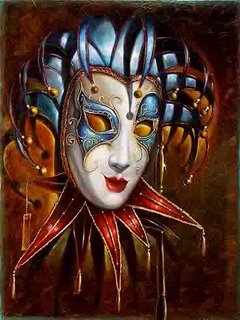
One of the things I enjoy about reading the types of books that I do, and in engaging in a continual research process, is the discovery of various rabbit trails that take a research project and thinking into new and exciting areas. This happened recently with my studies for the Burning Man festival. One of the books I read, Brian Doherty’s This is Burning Man (Little, Brown and Company, 2004), recommended another book as a means of trying to understand this festival phenomenon. The book was The Feast of Fools (Harper Colophon Books, 1969). I found the title and the context of sacred festivity in which the book was recommended highly intriguing. When I went to Amazon.com to find out more about the book, I discovered the subtitle, “A Theological Essay on Festivity and Fantasy,” and I figured this was an important read. I ordered a used copy (for a steal at a mere forty-nine cents plus shipping) and after receiving it earlier this week (and balancing it out with my reading for the rapidly approaching Fall semester at seminary) I’ve managed to read the Overture, the Introduction, and the first chapter.
I hope to gain further insights and applications as I continue to read through the book and reflect on its wisdom. But from what little I’ve read so far the book seems to have application not only to Burning Man, as well as to the Imaginarium theme for 2006 which looked at cultural festivals related to death, and to broader questions of culture, festivity, and fantasy. The latter application was apparent with Cox’s discussion of the Feast of Fools celebration in parts of Europe that flourished during the medieval era, but which has largely died out, surviving only in vestigial form in events like Halloween and New Year’s Eve parties.
Cox believes that human beings are “essentially festive and ritual creatures,” designed for both the expression of festivity and fantasy, but for a variety of reasons this aspect of celebrating what it means to be human and spiritual has largely died out in the modern and late modern West. Western forms of Christianity may have played a part in this as Cox rightly notes that “Christianity has often adjusted too quickly to the categories of modernity.” This has included a heavy emphasis on the Protestant work ethic. Not a bad thing to be productive mind you, but at the same something in us as individuals and as a culture dies without equal time given to festivity and fantasy. At this juncture might we ask just where any robust sense of sacred festivity and fantasy is to be found within typical expressions of Western evangelicalism?
I am part way through Cox’s discussion of festivity in relation to the philosophical notions of the death of God in the West. Remember that this book was written in 1969 as the so-called “counter-culture” was in full swing. While the death of God movement has largely died itself with various forms of Christianity as well as Western esotericism and Eastern spiritualities filling the vacuum, Cox’s discussion of the death of festivity and fantasy in the 1960s is instructive for its continued impoverishment in the 21st century West. For example, Cox discusses the differing ways in which religious traditions approach religion, with the historical religions of Judaism, Christianity, and Islam representing historical religions, and others, such as Tibetan Buddhism representing so-called “non-historical” religions that emphasize “the recurrent fundamentals of life and nature – the wheeling stars, the changing seasons, birth, sex, death. They help man situation himself in the larger cosmic setting. Cox notes that both approaches to religion have their value and place, but that we are missing the critical "point of intersection" between these worlds of history and divine mileu, and “our distorted Western attitude toward history and history-making” needs the corrective provided by celebration through festivity. (Might Christians be reminded of our shortcomings here with the emphasis on nature and festivity in neo-Paganism, if after all the so-called "cults" are indeed in some sense the unpaid bills of the church?) One sentence stuck out as I read this section where Cox provocatively asks, “If God returns we may have to meet him first in the dance before we can define him in the doctrine.”
I’m looking forward to my continued journey through this book that will surely involve lots of highlighting, wrestling with new theological and cultural questions, and attempts at applying it to a contemporary spiritual and cultural context.
Image source: http://www.feastoffools-phxaz.com/feast%20of%20fools%20mask%20left.jpg
No comments:
Post a Comment